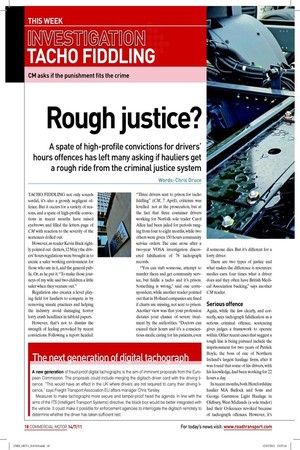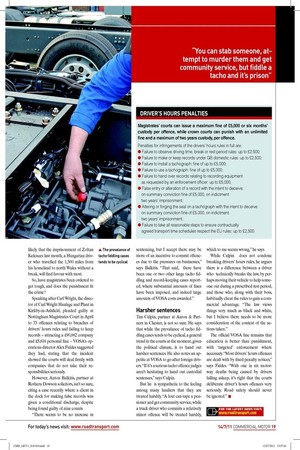Rough justice?
Page 15

Page 16

If you've noticed an error in this article please click here to report it so we can fix it.
A spate of high-profile convictions for drivers’ hours offences has left many asking if hauliers get a rough ride from the criminal justice system
Words: Chris Druce
TACHO FIDDLING not only sounds sordid, it’s also a grossly negligent offence. But it occurs for a variety of reasons, and a spate of high-proile convictions in recent months have raised eyebrows and illed the letters page of CM with reaction to the severity of the sentences dolled out.
However, as reader Kevin Buck rightly pointed out (letters, 12 May) the drivers’ hours regulations were brought in to create a safer working environment for those who are in it, and the general public. Or, as he put it: “To make those journeys of my wife and two children a little safer when they venture out.” Regulation also creates a level playing ield for hauliers to compete in by removing unsafe practices and helping the industry avoid damaging horror lorry crash headlines in tabloid papers.
However, that’s not to dismiss the strength of feeling provoked by recent convictions. Following a report headed:
“Three drivers sent to prison for tacho iddling” (CM, 7 April), criticism was levelled not at the prosecution, but at the fact that three container drivers working for Norfolk sole trader Carol Allen had been jailed for periods ranging from four to eight months, while two others were given 150 hours community service orders. The case arose after a two-year VOSA investigation discovered falsiication of 76 tachograph records.
“You can stab someone, attempt to murder them and get community service, but iddle a tacho and it’s prison. Something is wrong,” said one correspondent, while another reader pointed out that in Holland companies are ined if charts are missing, not sent to prison. Another view was that your profession dictates your chance of severe treatment by the authorities. “Doctors can exceed their hours and it’s a conscientious medic caring for his patients, even if someone dies. But it’s different for a lorry driver.
There are two types of justice and what makes the difference is resources: medics earn four times what a driver does and they often have British Medical Association backing,” says another CM reader.
Serious offence
Again, while the law clearly, and correctly, sees tachograph falsiication as a serious criminal offence, sentencing gives judges a framework to operate within. Other recent cases that suggest a tough line is being pursued include the imprisonment for two years of Patrick Boyle, the boss of one of Northern Ireland’s largest haulage irms, after it was found that some of his drivers, with his knowledge, had been working for 22 hours a day.
In recent months, both Herefordshire haulier MA Bullock and Sons and George Garmston Light Haulage in Oldbury, West Midlands (a sole trader) had their O-licences revoked because of tachograph offences. However, it’s likely that the imprisonment of Zoltan Kelences last month, a Hungarian driver who travelled the 1,300 miles from his homeland to north Wales without a break, will ind favour with most.
So, have magistrates been ordered to get tough, and does the punishment it the crime?
Speaking after Carl Wright, the director of Carl Wright Haulage and Plant in Kirkby-in-Ashield, pleaded guilty at Nottingham Magistrates Court in April to 33 offences relating to breaches of drivers’ hours rules and failing to keep records – attracting a £90,662 company and £5,616 personal ine – VOSA’s operations director Alex Fiddes suggested they had, stating that the incident showed the courts will deal irmly with companies that do not take their responsibilities seriously.
However, Anton Balkitis, partner at Rothera Dowson solicitors, isn’t so sure, citing a case recently where a client in the dock for making false records was given a conditional discharge, despite being found guilty of nine counts.
“There seems to be no increase in sentencing, but I accept there may be more of an incentive to commit offences due to the pressures on businesses,” says Balkitis. “That said, there have been one or two other large tacho iddling and record-keeping cases reported, where substantial amounts of ines have been imposed, and indeed large amounts of VOSA costs awarded.”
Harsher sentences
Tim Culpin, partner at Aaron & Partners in Chester, is not so sure. He says that while the prevalance of tacho iddling cases tends to be cyclical, a general trend in the courts at the moment, given the political climate, is to hand out harsher sentences. He also notes an appetite at VOSA to go after foreign drivers. “If it’s a serious tacho offence judges aren’t hesitating to hand out custodial sentences,” says Culpin.
But he is sympathetic to the feeling among many hauliers that they are treated harshly. “A lout can rape a pensioner and get community service, while a truck driver who commits a relatively minor offence will be treated harshly, which to me seems wrong,” he says.
While Culpin does not condone breaking drivers’ hours rules, he argues there is a difference between a driver who technically breaks the law, by perhaps moving their vehicle to help someone out during a prescribed rest period, and those who, along with their boss, habitually cheat the rules to gain a commercial advantage. “The law views things very much as black and white, but I believe there needs to be more consideration of the context of the actions taken.”
The oficial VOSA line remains that education is better than punishment, with ‘targeted’ enforcement where necessary. “Most drivers' hours offences are dealt with by ixed penalty notices,” says Fiddes. “With one in six motorway deaths being caused by drivers falling asleep, it’s right that the courts deliberate driver’s hours offences very seriously. Road safety should never be ignored.” ■
FOR THE LATEST NEWS VISIT:
www.roadtransport.com













































